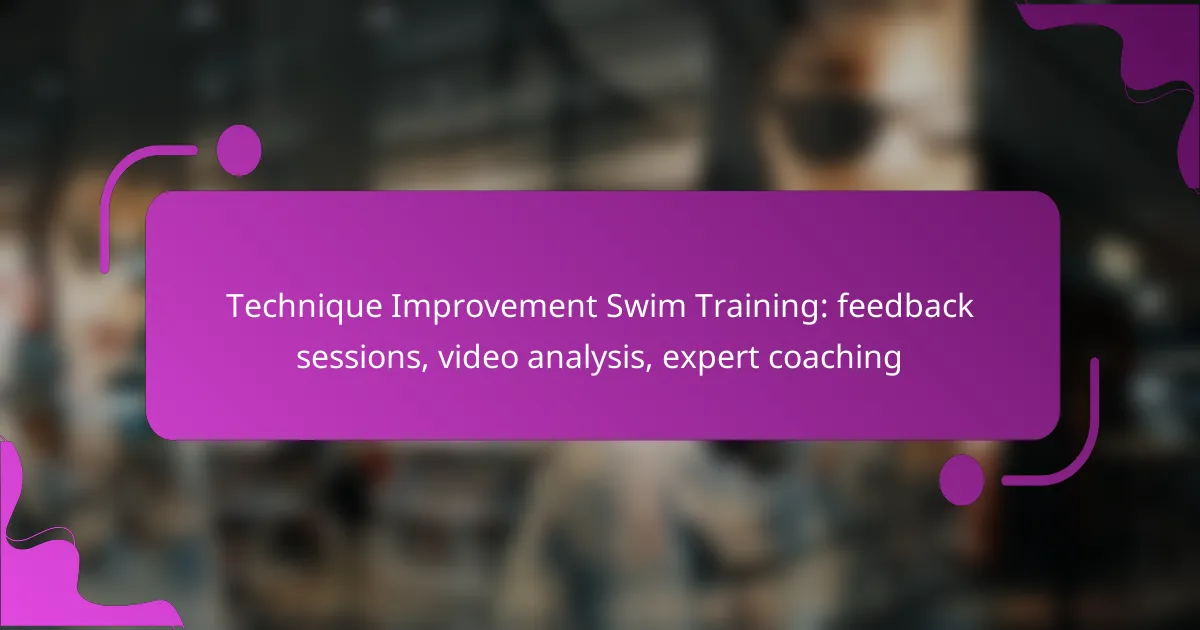Technique improvement in swim training is greatly enhanced through feedback sessions that incorporate video analysis and expert coaching. These methods provide swimmers with personalized insights into their performance, allowing for targeted adjustments and skill refinement. By utilizing precise observation and professional guidance, athletes can effectively elevate their technique and achieve their competitive goals.
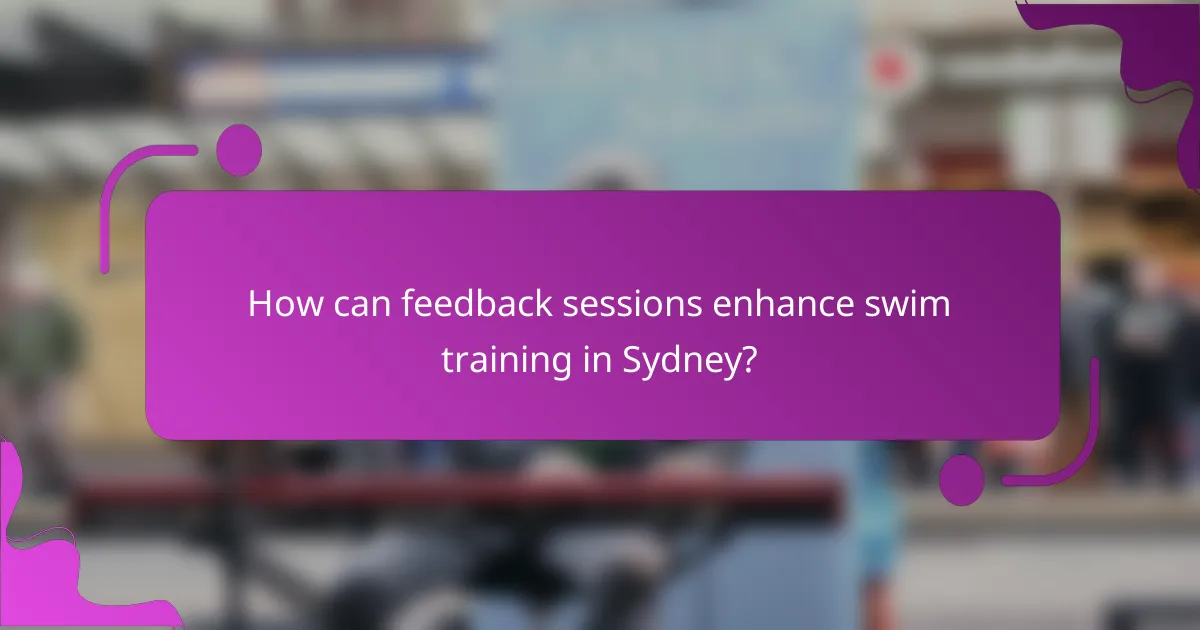
How can feedback sessions enhance swim training in Sydney?
Feedback sessions significantly improve swim training in Sydney by providing swimmers with tailored insights into their performance. These sessions often involve video analysis and expert coaching, allowing athletes to identify areas for improvement and refine their techniques effectively.
Personalized performance insights
Personalized performance insights are crucial for swimmers aiming to enhance their skills. Coaches can analyze individual strengths and weaknesses, offering specific feedback that aligns with each swimmer’s goals. For instance, a swimmer may receive tailored advice on stroke efficiency or breathing patterns, which can lead to more effective training sessions.
Utilizing video analysis during feedback sessions allows swimmers to visually comprehend their performance. This visual feedback helps in recognizing subtle errors that may not be apparent during practice, leading to more informed adjustments.
Immediate correction of techniques
Immediate correction of techniques is a key benefit of feedback sessions. Coaches can provide real-time guidance, allowing swimmers to adjust their form on the spot. This immediate feedback loop helps in reinforcing correct techniques and minimizing the development of bad habits.
For example, if a swimmer is struggling with their kick, a coach can demonstrate the correct movement and have the swimmer practice it right away. This hands-on approach ensures that corrections are understood and applied during the training session, leading to quicker improvement.
Increased motivation and accountability
Increased motivation and accountability are essential components of effective swim training. Feedback sessions create a structured environment where swimmers are encouraged to set and achieve personal goals. Knowing that they will receive feedback can motivate swimmers to push their limits and stay committed to their training.
Additionally, regular feedback fosters a sense of accountability. Swimmers are more likely to stay engaged and focused on their progress when they know their performance will be evaluated. This can lead to a more disciplined training regimen and ultimately better results in competitions.

What role does video analysis play in technique improvement?
Video analysis is a crucial tool for swimmers aiming to enhance their technique. It allows for precise observation of strokes, body positioning, and overall performance, enabling targeted feedback and adjustments.
Visual feedback for swimmers
Visual feedback through video analysis provides swimmers with immediate insights into their performance. By reviewing footage, athletes can see their strokes in real-time, which helps them identify areas needing improvement. This method enhances understanding of technique and promotes self-correction.
Swimmers can compare their movements against ideal techniques, which can lead to quicker adjustments and better performance outcomes. Regular sessions can reinforce learning and build confidence in their abilities.
Detailed breakdown of strokes
Video analysis allows for a detailed breakdown of each stroke, highlighting specific elements such as arm entry, kick timing, and breathing patterns. Coaches can use frame-by-frame analysis to pinpoint inefficiencies and suggest modifications. This granular approach helps swimmers focus on one aspect at a time, making improvements more manageable.
For instance, a coach might identify that a swimmer’s hand entry is too wide, which can create drag. By addressing this single issue, swimmers can see significant improvements in their overall speed and efficiency.
Comparison with professional standards
Comparing a swimmer’s technique with professional standards can provide a benchmark for improvement. Coaches can use video of elite athletes to illustrate optimal techniques, helping swimmers visualize the goals they should strive for. This comparison can motivate swimmers to refine their skills further.
Additionally, understanding the differences between their performance and that of professionals can highlight specific areas for development. This targeted approach can lead to more effective training sessions and measurable progress over time.
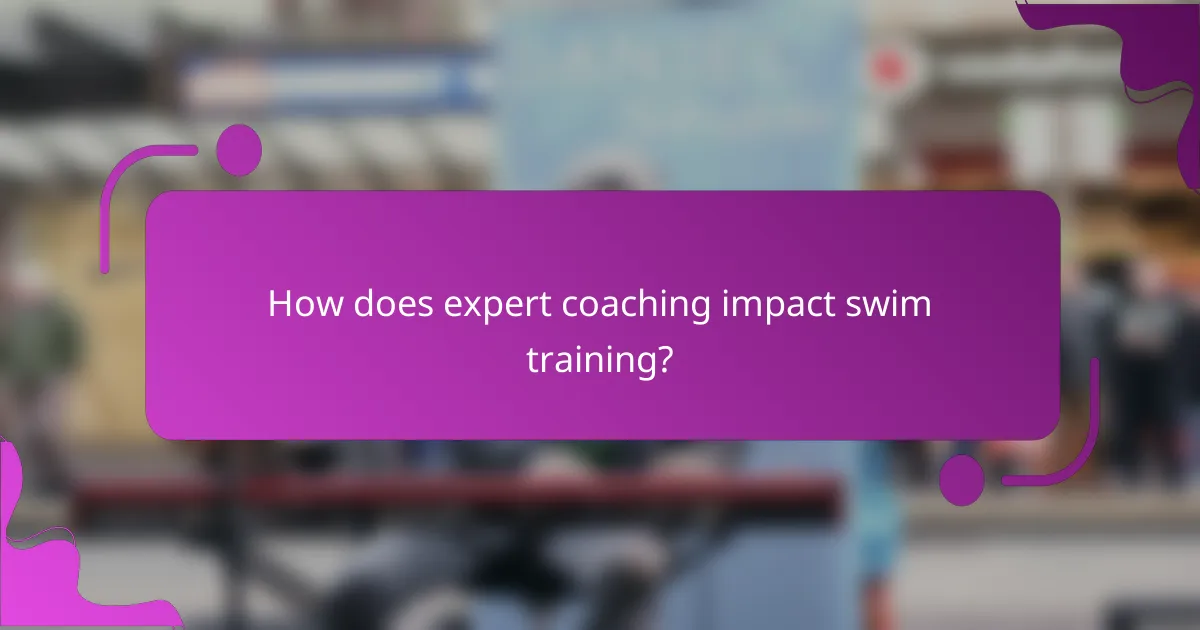
How does expert coaching impact swim training?
Expert coaching significantly enhances swim training by providing swimmers with personalized guidance, specialized techniques, and performance insights. Coaches leverage their experience to help athletes refine their skills, optimize their training, and achieve competitive success.
Access to specialized knowledge
Expert coaches possess extensive knowledge of swimming techniques, training methodologies, and competitive strategies. They stay updated on the latest advancements in swim training, including biomechanical analysis and sports psychology, which can greatly benefit swimmers at all levels.
This specialized knowledge allows coaches to identify swimmers’ strengths and weaknesses, enabling them to offer targeted advice that can lead to rapid improvement. For example, a coach may introduce specific drills that enhance stroke efficiency or endurance based on individual assessments.
Tailored training plans
With expert coaching, swimmers receive customized training plans that align with their unique goals, abilities, and competition schedules. These plans consider factors such as the swimmer’s age, skill level, and physical condition, ensuring a balanced approach to training.
Tailored training can include variations in intensity, volume, and focus areas, such as sprinting or distance swimming. Regular assessments and adjustments to the plan help maintain progress and prevent plateaus, maximizing the effectiveness of each training session.
Enhanced competitive edge
Expert coaching provides swimmers with a competitive edge by equipping them with advanced techniques and strategies that are often not available through self-training. Coaches can help athletes develop mental resilience, race strategies, and pacing tactics that are crucial during competitions.
Additionally, the accountability and motivation provided by a coach can lead to improved performance. Swimmers may find themselves pushing harder and achieving personal bests when supported by an expert who understands their potential and challenges them to excel.
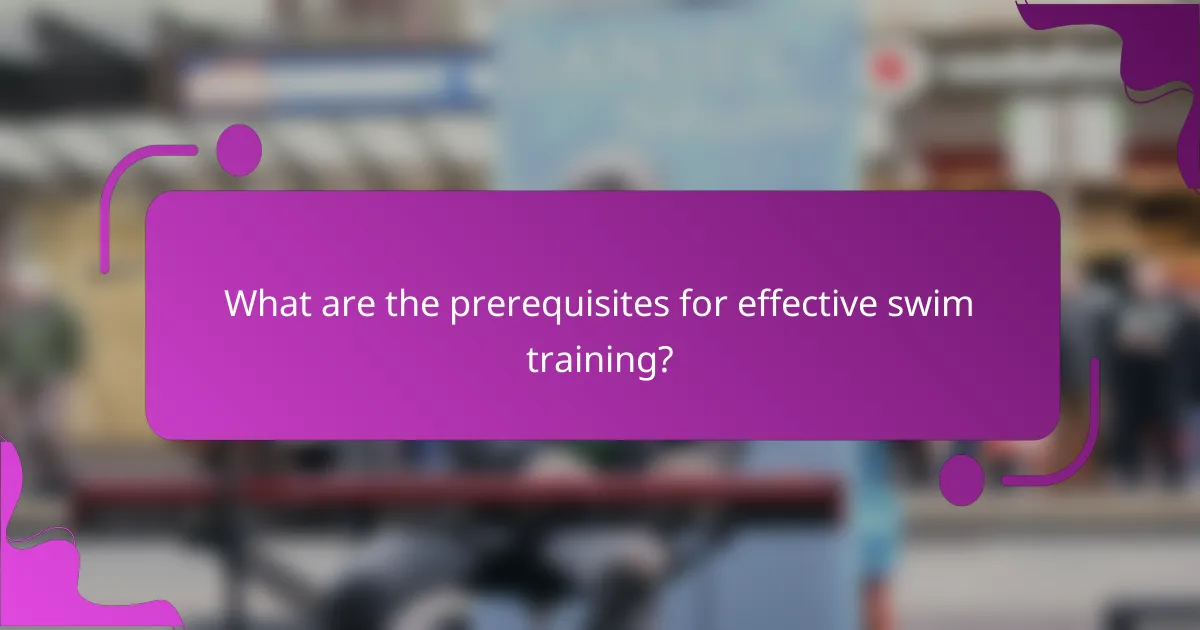
What are the prerequisites for effective swim training?
Effective swim training requires a clear understanding of the swimmer’s current skill level and access to suitable training facilities. These factors significantly influence the training approach and the potential for improvement.
Swimmer’s current skill level
Assessing a swimmer’s current skill level is crucial for tailoring an effective training program. Beginners may need to focus on basic techniques and water comfort, while advanced swimmers can concentrate on refining strokes and improving speed.
To evaluate skill levels, consider using standardized assessments or time trials. For example, a novice might take 30-60 seconds to swim 25 meters, while an experienced swimmer may complete it in under 15 seconds. This information helps in setting realistic goals.
Availability of training facilities
Access to appropriate training facilities is essential for effective swim training. Ideal facilities should include a well-maintained pool, lane markings, and safety equipment. Availability of coaching staff and video analysis tools can further enhance training effectiveness.
When selecting a facility, consider factors such as pool size, water temperature, and hours of operation. A standard competition pool is 25 meters long, which is suitable for most training sessions. If possible, choose locations that offer additional resources like underwater cameras for technique analysis.
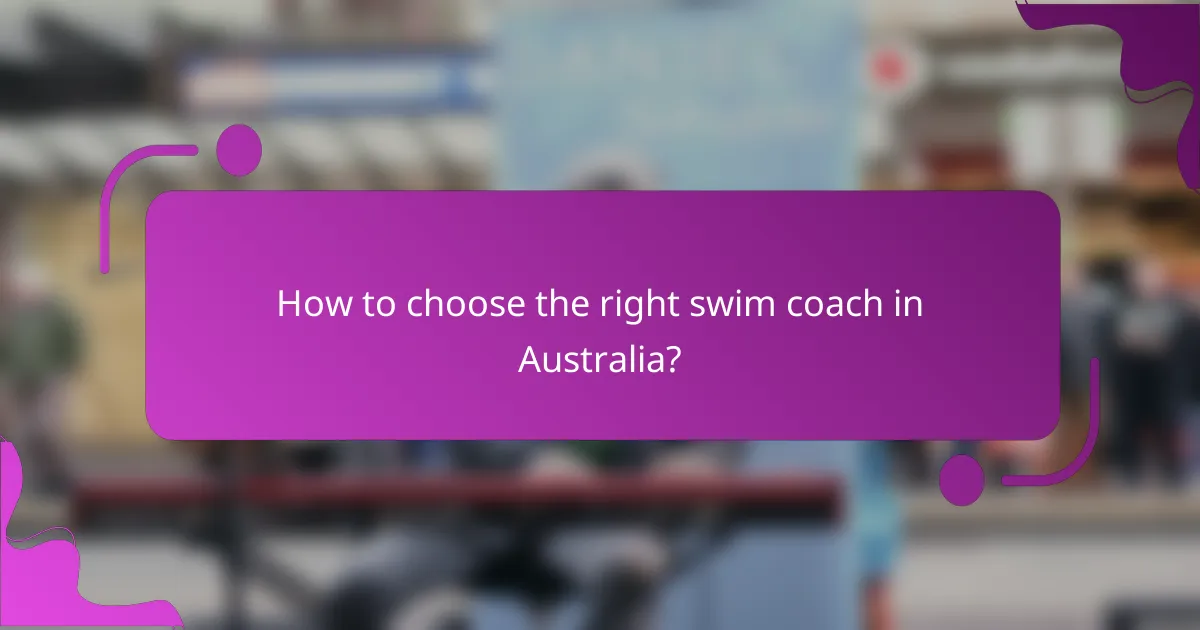
How to choose the right swim coach in Australia?
Choosing the right swim coach in Australia involves evaluating their qualifications, coaching style, and proven success with other swimmers. A good coach should align with your specific training goals and provide a supportive environment for improvement.
Qualifications and experience
When selecting a swim coach, consider their formal qualifications and coaching experience. Look for certifications from recognized organizations, such as Swimming Australia or ASCTA, which indicate a solid foundation in coaching principles and techniques.
Experience is equally important; a coach with several years of training swimmers at various levels can offer valuable insights. Ideally, find a coach who has worked with athletes similar to your skill level and goals, whether you’re a beginner or preparing for competitions.
Coaching style and compatibility
Coaching style can significantly impact your training experience. Some coaches emphasize technique and precision, while others focus on endurance and competitive strategies. Assess what approach resonates with you and your learning preferences.
Compatibility is key; a coach who communicates effectively and fosters a positive atmosphere can enhance your motivation and progress. Consider attending a trial session to gauge the coach’s style and see if it aligns with your needs.
Success stories and testimonials
Researching a coach’s success stories and testimonials can provide insight into their effectiveness. Look for reviews from past or current swimmers that highlight specific improvements or achievements under their guidance.
Additionally, ask the coach for references or examples of swimmers they have trained successfully. A coach with a track record of helping athletes reach their goals is more likely to assist you in achieving your own swimming aspirations.

What are the benefits of group training sessions?
Group training sessions offer numerous advantages, including enhanced motivation and access to diverse coaching techniques. Participants can benefit from shared experiences and collective feedback, which can lead to improved performance and technique.
Cost-effective coaching options
Group training sessions often reduce the cost per participant compared to individual coaching. This makes high-quality coaching more accessible, allowing swimmers to receive expert guidance without the financial burden of private lessons.
Many facilities offer packages for group sessions, which can range from a few sessions to several weeks. This flexibility allows swimmers to choose options that fit their budget while still receiving valuable coaching.
Team building and camaraderie
Participating in group training fosters a sense of community among swimmers, enhancing team spirit and motivation. The shared experience of training together can lead to lasting friendships and a supportive environment.
Swimmers often encourage each other during sessions, which can boost individual performance. This camaraderie can be particularly beneficial during competitions, where having a supportive team can make a significant difference in morale and results.
